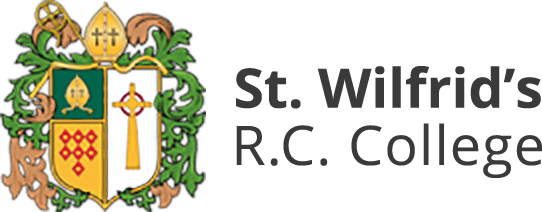The English curriculum aims to promote confidence, imagination and curiosity through the exploration and creation of a diverse range of literary texts. Our Catholic faith is at the centre of our curriculum with the Gospel Values shaping the way that we teach and our text choices; students are encouraged to be compassionate and it is our intent that our curriculum opens their eyes to the different experiences and cultures that shape our global and local community. Students develop originality, independence and critical evaluation skills in their writing by being encouraged to engage with a range of classic and contemporary fiction and non-fiction. Students develop a love of learning through reading by exploring a wealth of writing types, genres and authors. St Wilfrid’s English curriculum supports the whole school and BCCET vision of creating resilient and fluent readers. We adopt a rigorous approach to supporting students with their reading, writing and communication. Our curriculum includes: explicit teaching of ambitious and challenging vocabulary in order to equip students with the tools to excel in their lessons; opportunities to engage with challenging texts including texts that are from other cultures, time periods and authors from diverse backgrounds and a range of topics and text choices which aim to enrich our students’ cultural capital. Our curriculum is challenging for all; our students study whole texts from a range of time periods and genres; plays, prose and poetry and we study two Shakespeare plays.
Key Stage Three
Our KS3 curriculum builds on the skills developed at KS2. We continue to develop our students’ abilities by: introducing the skill of comparison, identifying viewpoints and perspectives; considering key concepts such as authorial intent, social moral and historical contexts and engaging with a range of genres. We develop students’ writing stamina by: introducing them to analytical essay writing; transactional writing and by continuing to build on the foundations of fiction and non-fiction writing that have been introduced at KS2.
Key Stage Four
At KS4, our students begin to study for their GCSE Examinations where they study the texts prescribed by the AQA Literature and Language specification. Students critically examine The Strange Case of Dr Jekyll and Mr Hyde by Stevenson, Much Ado About Nothing by Shakespeare, An Inspector Calls by Priestley, a selection of unseen poems plus the Power and Conflict Poetry Anthology set by AQA. For their English Language GCSE, students study a wide range of extracts to support them with their studies of creative reading and writing and support them with their studies of writers’ viewpoints and perspectives.
Key Stage Five
At KS5, students can choose to take A-Level English Language and/or A-Level English Literature, both of which are courses that are regarded highly by universities and employers alike. Studying English Language allows students to engage with spoken language, particularly how a child develops language, as well as challenging the language used within the media, politics, law, medicine and beyond. The course engages with theory and research, as well as a vast range of texts, allowing students to become critical users of language and develop journalistic skills.
In English Literature, students engage with challenging texts including poetry, plays and prose, examining themes such as inequality, isolation and identity, to name but a few. Students will be exposed to new types of texts that they have yet to encounter, such as contemporary Canadian fiction, plastic theatre and supports them in developing their critical voices.
Assessment and Homework
Students are set regular homework which aims to support the learning taking place in school. This homework includes but is not limited to: reading, spellings, new vocabulary, knowledge recall, pre-reading and extended writing opportunities.
Formative assessment opportunities are built into each lesson in our curriculum with students receiving regular feedback on their reading, writing and spoken language skills from their teachers. Assessment includes knowledge recall, assessment of extended writing
Raising Readers
Each KS3 class has one dedicated library lesson per fortnight where teachers and students continue to develop their passion for reading. We have a highly targeted support programme in place for students who have gaps in reading, writing and communication. This includes small group intervention using a combination of the Soundswrite phonic programme, Lexia and Accelerated Reader. We also offer lunchtime reading support groups and extra-curricular activities such as Spelling Bee, The North East Book Awards and The National Teen Book Club. In KS4 and KS5, we regularly embed opportunities for students to continue to develop their reading, writing and communication skills. All students in school have dedicated reading time built into the school day.


